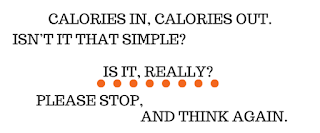I'm watching a strew of "My 600 lb life" shows. They're cathartic. They're "my" people. I may have not been 600 lbs, but I was 600 lbs in the making.
Believe it or not, at my heaviest, I struggled to keep the calories down. To look at me then, most would just assume I ate what I felt like. I certainly did not. I knew that if I allowed myself free reign, I'd pack on more pounds. My JUDDD UD calories of 2200 was higher than I typically ate pre-JUDDD. (And now, the 2800+ calorie CCs far exceed my wildest dreams, but Spiking with JUDDD is another topic.)
Over the last year, I've often told friends, "I'm not sure how in the world I lost this weight." I amazed even myself. And what was I missing all those earlier years, besides? What gave me such a slow metabolism in the first place? Even now, I look back and don't feel that I truly deserved to be the weight I was most of my childhood and adulthood. No, I did NOT live on celery, but I didn't lose weight like "normal" people do.
I have struggled over the last year after dropping the ball on being more vigilant with my protein intake. A lack of protein was slowing my body down once again. How could I have let that slide?!
Protein revs your metabolism, whether you believe me or not.
Protein can make or break your weight loss efforts, no matter which plan you follow. I challenge you, if you're struggling to find your niche, "How is your protein?" This is a tool you can incorporate, without doing anything else, and you may very well see the scale drop. I got started by making sure to get in 100 g. protein per day.
Over the last year, I've often told friends, "I'm not sure how in the world I lost this weight." I amazed even myself. And what was I missing all those earlier years, besides? What gave me such a slow metabolism in the first place? Even now, I look back and don't feel that I truly deserved to be the weight I was most of my childhood and adulthood. No, I did NOT live on celery, but I didn't lose weight like "normal" people do.
I have struggled over the last year after dropping the ball on being more vigilant with my protein intake. A lack of protein was slowing my body down once again. How could I have let that slide?!
Protein revs your metabolism, whether you believe me or not.
Protein can make or break your weight loss efforts, no matter which plan you follow. I challenge you, if you're struggling to find your niche, "How is your protein?" This is a tool you can incorporate, without doing anything else, and you may very well see the scale drop. I got started by making sure to get in 100 g. protein per day.











